Close UP
Japan Myanmar Culture Center (JMCC) ~Working for Myanmar, close to its people, and building bridges between Japan and Myanmar.~
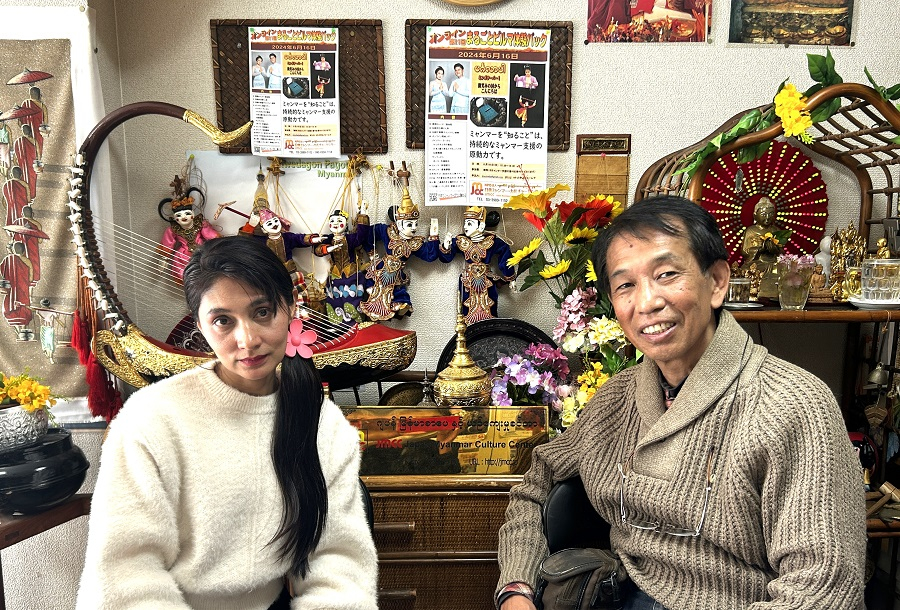
The Japan Myanmar Culture Center (JMCC), an NPO headed by Myanmar national Ms. Ma Hay Mar, is an encouraging support for Myanmar people in Japan.
The JMCC is based in Takadanobaba, Tokyo, and receives many inquiries from Japan and Myanmar. We spoke with Ms. Ma Hay Mar, Director, and Mr. Kiyoshi Ochiai, Chairman of the Board, about the activities of JMCC.
※This article is based on a March 19, 2025, interview.
Founding a Non-profit Organization Based on Experiences at a Monastery in Myanmar
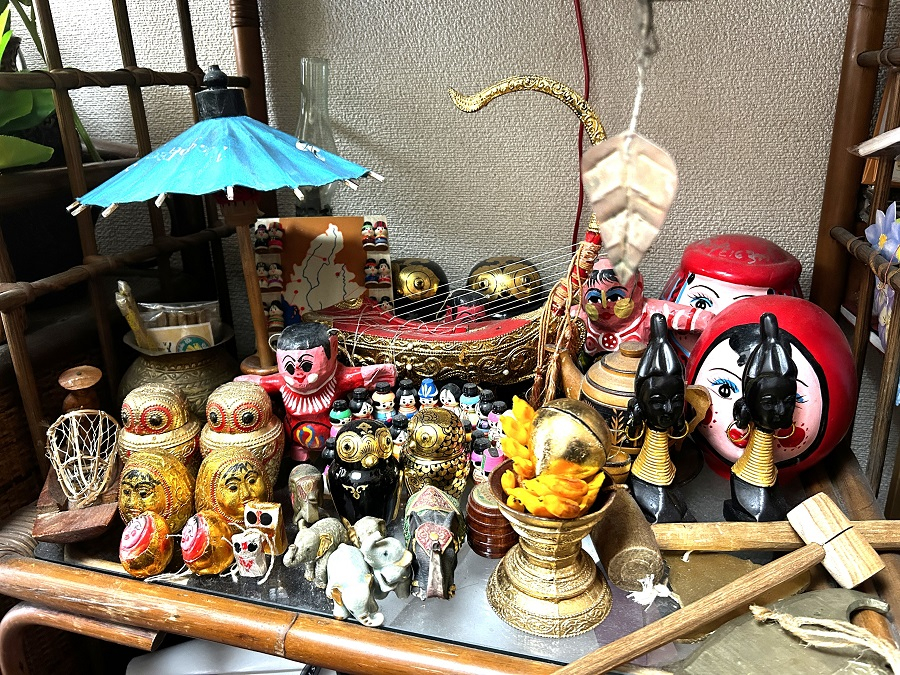
The Japan Myanmar Culture Center (JMCC) was founded in 2002 and has operated as a non-profit organization since 2005. It is headed by Ms. Ma Hay Mar, a Myanmar national, and is well-trusted by the Myanmar people living in Japan. The organization's activities began with Ms. Ma Hay Mar's desire to build a bridge between Japan and Myanmar. Current activities include Myanmar (Burmese) language classes for Japanese, introduction of the culture of Myanmar, daily life support and Japanese language classes for Myanmar people living in Japan, and support activities for Myanmar.
Ms. Ma Hay Mar is from Meiktila, Myanmar. At a monastery in Meiktila, Master U Dhammatara taught English and Japanese to children, and Ms. Ma Hay Mar was the first disciple of Master U Dhammatara. And she taught Japanese to Myanmar children.
"Master U Dhammatara was a monk, but he also accepted non-Buddhists and taught them English and Japanese in Myanmar. Today, many foreign tourists visit his monastery. It is wonderful to share the beauty of Myanmar culture with so many people. Creating a place open to all kinds of people, like his monastery, is our vision," says Ms. Ma Hay Mar.
Mr. Kiyoshi Ochiai, JMCC Chairman of the Board, is one of those who are fascinated by the country of Myanmar and is devoted to the study of its culture. Mr. Ochiai and Ms. Ma Hay Mar are partners in both work and life, and Mr. Ochiai has supported the organization since its inception. However, Mr. Ochiai has been completely involved in JMCC operations since 2018 and is currently in charge of Japanese language classes. He used to be a teacher. Having seen his teacher from school days whom he admired set off on a round-the-world trip, saying that they could not teach world history if they did not know about the world, Mr. Ochiai began to visit various countries as well. And Myanmar was the country that attracted Mr. Ochiai the most.
"When I was there in 1990, I did not feel a sense of Myanmar's poverty at all, even though it was one of the poorest countries in the world. There were no beggars in the towns, people were kind to me as a foreigner, and I felt a sense of pride from the people. I got a culture shock."
Myanmar (Burmese) Language Classes to Introduce the Culture of Myanmar
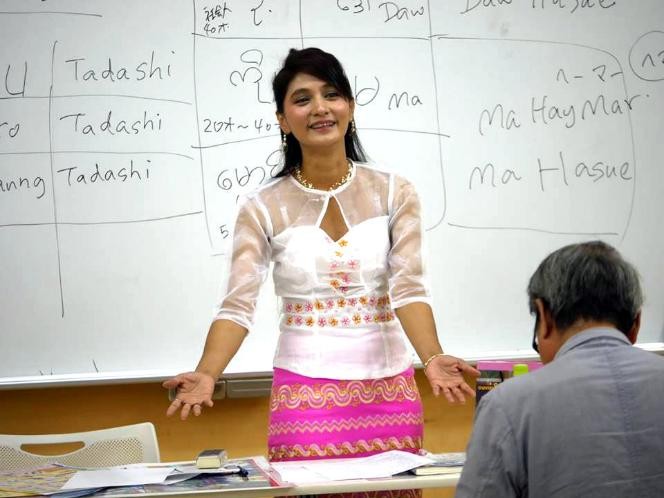
Photo Courtesy: JMCC
The JMCC has continued to hold Myanmar (Burmese) language classes and cultural introduction events since the beginning of its activities to convey Myanmar's charms.
Ms. Ma Hay Mar, who taught Japanese at a monastery in Myanmar, holds Myanmar (Burmese) language classes. These classes are attended by people like Mr. Ochiai, who are fascinated by Myanmar, are interested in its culture, and want to travel there one day. Other participants include researchers of Myanmar culture, people related to the government and the Ministry of Foreign Affairs, writers, people studying Buddhism, and many others.
The JMCC has provided a variety of opportunities for participants to experience the culture of Myanmar, including cooking classes, Myanmar (Burmese) harp classes, traditional dance classes, and events to wear ethnic costumes. "We have been teaching cooking classes for a long time. Even in our Myanmar (Burmese) classes, we try to convey not only the language but also the culture," says Ms. Ma Hay Mar.
During the COVID-19 pandemic, JMCC held a cultural introduction event connecting Myanmar and Japan via Zoom. Virtual travel was conducted as part of the event, and many travel agencies and others visited the JMCC office to learn more about JMCC's programs. "When things trend, many people come up with similar activities, but after a certain time, there are fewer and fewer of them. Our goal is to continue (our activities) steadily and for a long time, no matter how small they become," says Mr. Ochiai.
The Myanmar people tell real stories because they operate with the values of the Myanmar people.
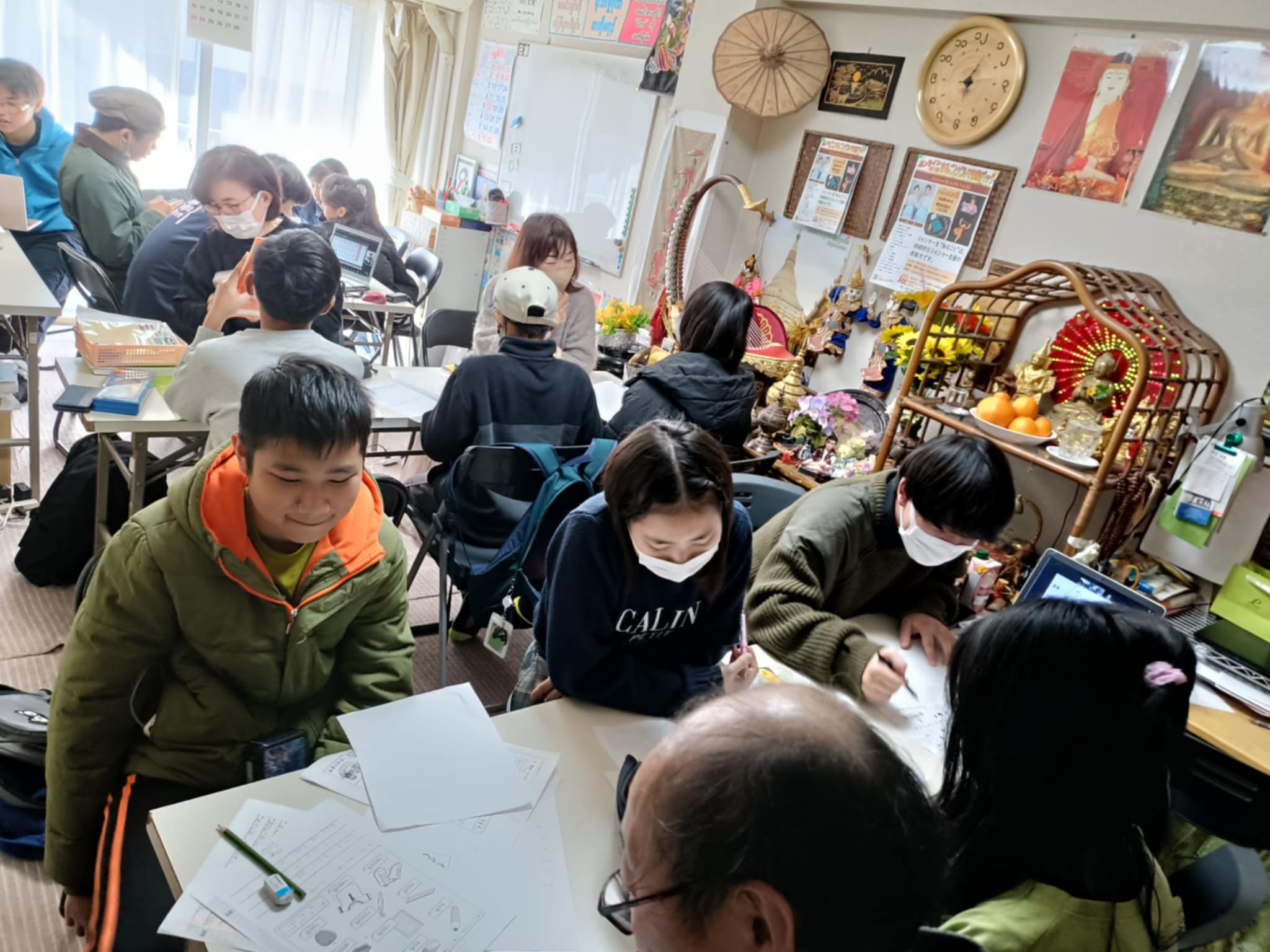
Photo Courtesy: JMCC
The JMCC is an organization organized by a Myanmar person and operated by Myanmar people with Myanmar values, so it provides emotional support to many Myanmar people living in Japan. Myanmar residents from all over Japan contact Ms. Ma Hay Mar for advice. Many Myanmar people are not at ease in their lives in Japan due to the differences in culture and values between Myanmar and Japan.
"In Myanmar, it is common for parents and nannies to take care of their children and children's belongings. In the past, there was a case where a mother carried her child's bags to school, as she customarily did in Myanmar, as a result, the child had difficulty making friends and felt left out at school. Those who have come (to Japan) on work visas also find it difficult to talk to those around them about problems they encounter at work or in their dormitories. They hear about me by word of mouth and contact me by messenger or phone. They open up to me about their various feelings, including frustrations and anxieties that are difficult to talk about in front of Japanese people," says Ms. Ma Hay Mar. She kindly answers many people's questions and concerns every day.
The JMCC hosts a children's club every Sunday. It provides opportunities for children with Myanmar roots to learn the Myanmar (Burmese) language and experience both Myanmar and Japanese culture, to help them develop a sense of identity and adapt to Japanese society. Since Japanese children can also participate, the event has become a place for international exchange among children. In addition, it provides support for parents, such as translating school handouts into Myanmar (Burmese).
Myanmar people are helping each other positively under the slogan "wadhana".
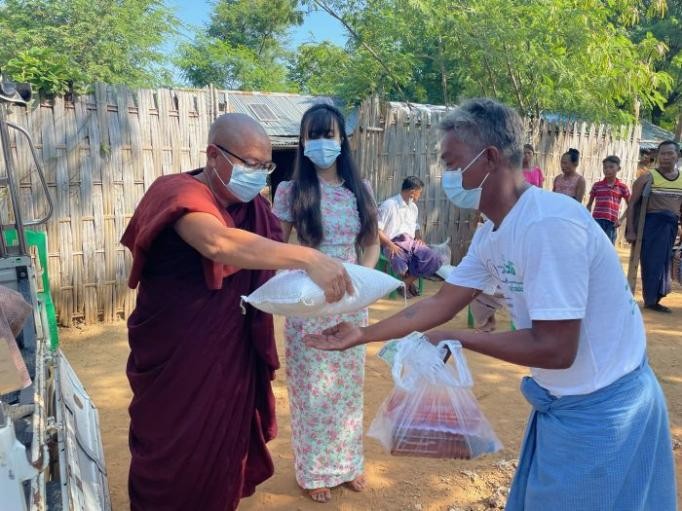
The JMCC began supporting leprosy treatment centers, orphanages, and monasteries in 2003. Since then, JMCC has provided on-site assistance to Myanmar every year. It has been going into areas inhabited by ethnic minorities where international aid has been inaccessible, and has provided support. The organization says that no matter how much they communicate online, there are things they can only hear when they go into the field.
"We are not doing this activity to make money. So, we want to do something that is truly needed, something that others cannot do. We hope that because we are a small organization, we can be flexible and pay attention to details," says Ms. Ma Hay Mar.
These support activities in Myanmar and in Japan are supported by many Myanmar people living in Japan. When Cyclone Nargis hit Myanmar in 2008, the Myanmar people living in Japan sent 2 million yen in total as donations to JMCC.
In the World Giving Index, which measures the percentage of people who donate and their level of awareness, Japan ranked lowest in 2021 and second from the bottom in 2024, indicating that the culture of charity is not widespread in Japan. Myanmar, on the other hand, has been ranked first in the World Giving Index many times, and it is said that charity and mutual aid are very commonplace in Myanmar. Myanmar people are said to always be quick to donate, as in the event of a disaster in Japan, for example. "For Myanmar people, living and charity are a package deal. People are willing to donate if they can afford it. There is a word in the Myanmar (Burmese) language called wadhana. It translates as 'hobby,' but in terms of meaning, it is probably closer to vocation or life's work. People are donating because they enjoy (charity) and it gives meaning to their lives," says Mr. Ochiai.
The Worsening of the Situation in Myanmar Leads to a Flood of Participants in Japanese Language Classes
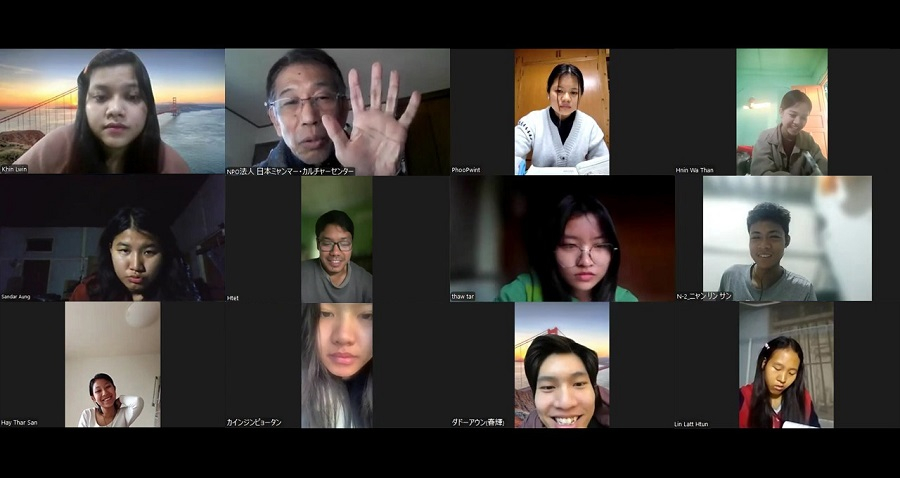
Currently, JMCC's primary focus is Japanese language classes for Myanmar people. The situation in Myanmar has deteriorated since the coup d'état by the Myanmar army, and the number of Myanmar people living in Japan, which was 35,000 before the coup, is now 110,000 and growing at an accelerating rate. Furthermore, with the conscription system starting in 2024, and restrictions on leaving the country, many people are seeking to come to Japan on work or student visas.
"People who are considered to be of the intellectual class in Myanmar, who are highly qualified, have no choice but to come to Japan to study English and Japanese at night, while working. The people of Myanmar, who are full of ambition, are worthy of respect, and their existence gives me power," says Mr. Ochiai.
The JMCC's Japanese language classes are attended by around 100 people each month, not only Myanmar people living in Japan, but also online participants from Myanmar. The JMCC's Japanese language classes were started in 2002 by volunteer Japanese teachers. They have continued every Sunday for more than 20 years. Mr. Ochiai has been teaching Japanese there for the past five years. He currently teaches seventeen 90-minute classes a week.
Ms. Ma Hay Mar and Mr. Ochiai say they want Japanese people to know more about Myanmar. "There are many countries in the world in a difficult situation, but please don't forget about Myanmar. Even if (you) can't do anything directly, we believe that your interest in Myanmar will inspire and encourage them (the people of Myanmar). (Myanmar is) in a difficult situation right now, but it is a wonderful country with a rich culture and nature. Once the situation settles down, I would like you to visit Myanmar," says Mr. Ochiai.
For more than 20 years, JMCC has been a bridge between Myanmar and Japan, and continues to be a unique presence.
Underlying its existence is Ms. Ma Hay Mar and Mr. Ochiai's deep love for having fun and helping each other.
*This article is based on information available at the time of the interview. For the latest information, please contact the organization directly.
